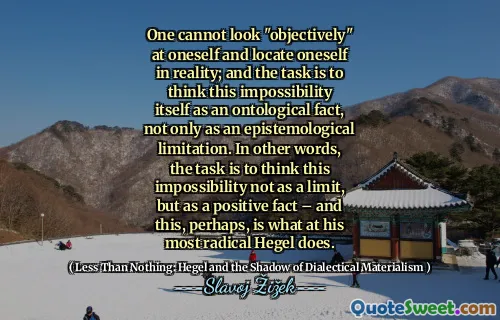
One cannot look "objectively" at oneself and locate oneself in reality; and the task is to think this impossibility itself as an ontological fact, not only as an epistemological limitation. In other words, the task is to think this impossibility not as a limit, but as a positive fact – and this, perhaps, is what at his most radical Hegel does.
This quote invites a profound contemplation of self-awareness and the nature of objective understanding. It suggests that the very act of viewing oneself without bias, as an outsider or from a neutral or objective perspective, is fundamentally impossible. This impossibility is not merely a shortcoming of human cognition but signifies an intrinsic ontological limit—an inherent aspect of our being that shapes how we relate to ourselves and the world. Instead of perceiving this inability as a mere epistemological challenge or a flaw in our knowledge systems, Žižek argues that it should be embraced as a positive ontological fact. Recognizing the limitation as a fundamental property of existence opens avenues for rethinking the nature of self-identity and knowledge. It echoes the Hegelian recognition that contradictions and limitations are vital to reality's fabric, suggesting that contradiction itself can be understood as a core feature, not simply a problem to overcome. This perspective has radical implications for philosophy: it encourages a shift from seeking pure objectivity to accepting the intertwined, dialectical relationship between oneself and external reality. Human consciousness, then, is always situated within a web of subjective and objective tensions, and recognizing this as a positive fact allows for a more honest, nuanced engagement with reality. Žižek's interpretation of Hegel challenges us to rethink our assumptions about certainty and the nature of self-knowledge, emphasizing the importance of embracing dialectical contradictions rather than denying or neglecting them. Ultimately, this thought fosters a productive humility about our epistemological limits and pushes us toward a more dialectical understanding of existence.






